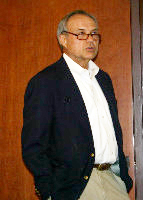Professor Charles Koch Delivers 2009 St. George Tucker Lecture
Professor Koch described how the European Economic Community (EEC) came into being in 1957 as a simple treaty between six nations. It has mushroomed, now encompassing 27 nations and half a billion people. It is likely to continue expanding. It is now called the European Union. As its original name implies it was understood as an economic organization but today it has evolved into a sovereign state (but not a nation state). In doing so, it has chosen some rules and structures fundamentally different from the United States.
 The lecture examined some of the more salient differences in “constitutional” choices in order to better understand federalism, supranational government, and sovereignty in general. For that purpose, it compared the role of the U.S. states with that of the EU constituent nations, “member states.” It focused on the choice between the written versus unwritten basis for human rights; the ceding of state sovereignty to a federal judiciary; and hieratical versus network approaches to policymaking. Despite the title of the talk, Koch did not advocate one set of choices over the other but rather suggested each community might well learn from the other.
The lecture examined some of the more salient differences in “constitutional” choices in order to better understand federalism, supranational government, and sovereignty in general. For that purpose, it compared the role of the U.S. states with that of the EU constituent nations, “member states.” It focused on the choice between the written versus unwritten basis for human rights; the ceding of state sovereignty to a federal judiciary; and hieratical versus network approaches to policymaking. Despite the title of the talk, Koch did not advocate one set of choices over the other but rather suggested each community might well learn from the other.The St. George Tucker Lecture Series was established in 1996 to recognize the scholarly achievements of a senior member of the William & Mary law faculty each year. The series is made possible through the generosity of Law School alumni.
St. George Tucker was the second professor of law at William & Mary and a pioneer in legal education. He drafted a formal description of the requirements for a law degree at the College, which included an exacting schedule of qualifying examinations in history, government and related pre-law subjects. Tucker's course material was published as the first American edition of Blackstone's Commentaries on the Laws of England. For a generation, Tucker's volume was considered the leading authority on American law.
